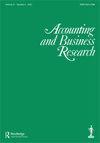资本预算和管理帝国建设
IF 1.4
4区 管理学
Q2 BUSINESS, FINANCE
引用次数: 2
摘要
我研究了一家公司的总部如何使用帝国大厦经理关于决策相关私人信息的报告来做出资本预算决策并补偿经理。为此,我构建了一个由总部(委托人)和经理(代理人)组成的模型,经理报告投资项目的预期盈利能力。我确定了最佳的投资规模和薪酬支付,其中总部权衡管理信息租金——这是由于帝国建设的好处导致经理倾向于过度投资——以换取投资效率。总部以投资不足(或过度投资)的形式来抵消经理过度投资的愿望,以获得高(或低)预期盈利能力。由于这些扭曲,预期的补偿在帝国建设效益水平上并不单调。与以往的资本预算研究不同,在本研究中,我发现管理帝国建设效益可以多方向影响公司的最优资本预算决策和相关薪酬方案。本文章由计算机程序翻译,如有差异,请以英文原文为准。
Capital budgeting and managerial empire building
I examine how a company's headquarters use an empire-building manager's report about decision-relevant private information to make capital budgeting decisions and compensate the manager. To this end, I construct a model comprising the headquarters (principal) and the manager (agent), who reports on the investment project's expected profitability. I identify the optimal investment sizes and compensation payments, where the headquarters trade off managerial information rents – arising from empire-building benefits inducing the manager to favour overinvestment – for investment efficiency. The headquarters counteract the manager's desire for overinvestment with investment distortions in the form of underinvestment (or overinvestment) for a high (or low) expected profitability. Due to these distortions, the expected compensation is not monotone in the level of empire-building benefits. Unlike previous capital budgeting studies, in this study, I show that managerial empire-building benefits can multi-directionally affect companies' optimal capital budgeting decisions and related compensation schemes.
求助全文
通过发布文献求助,成功后即可免费获取论文全文。
去求助
来源期刊

Accounting and Business Research
BUSINESS, FINANCE-
CiteScore
3.40
自引率
11.80%
发文量
38
期刊介绍:
Accounting and Business Research publishes papers containing a substantial and original contribution to knowledge. Papers may cover any area of accounting, broadly defined and including corporate governance, auditing and taxation. However the focus must be accounting, rather than (corporate) finance or general management. Authors may take a theoretical or an empirical approach, using either quantitative or qualitative methods. They may aim to contribute to developing and understanding the role of accounting in business. Papers should be rigorous but also written in a way that makes them intelligible to a wide range of academics and, where appropriate, practitioners.
 求助内容:
求助内容: 应助结果提醒方式:
应助结果提醒方式:


